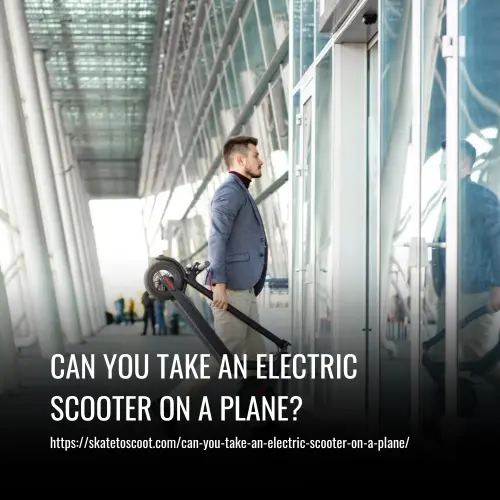Can You Take an Electric Scooter on a Plane?
This post contains affiliate links. As an Amazon Associate, we earn from qualifying purchases.
In most cases, you won’t be able to bring your electric scooter on a plane with you. Some airlines may allow it if the battery is packed separately in a protective case, but these exceptions usually apply to devices classified as mobility aids.

Why Can’t You Bring Your Electric Scooter on a Plane
Electric scooters have become a popular mode of transportation in urban areas, but unfortunately, bringing them on a plane is not allowed due to strict regulations imposed by the Federal Aviation Administration (FAA). The main concern lies with the lithium-ion batteries that power these scooters.
1. Hazardous Material Classification
According to the FAA, electric scooters with lithium-ion batteries are classified as hazardous materials and are therefore prohibited on commercial flights. This is because these batteries have a risk of fire, especially in a pressurized aircraft cabin. The potential danger outweighs the convenience of bringing an electric scooter on board.
2. TSA Confiscations
In the past, attempts to bring electric scooters on planes have led to confiscations by the Transportation Security Administration (TSA). In 2019 alone, the TSA reported confiscating over 4,000 hoverboards and electric scooters at airport security checkpoints due to their lithium-ion batteries. This not only causes frustration for travelers, but it can also be a costly experience.
Airline Rules Or Regulations Regarding The Transportation Of Electric Scooters
When it comes to bringing an electric scooter on a plane, the primary concern lies in the battery it uses. Airlines have strict regulations due to the risk of lithium-ion batteries overheating or catching fire. Here we will summarize the rules and guidelines set by aviation authorities for transporting electric scooters on board.
Battery Size Restrictions
Airline regulations categorize batteries based on their watt-hour ratings for international flights:
1. 100 Watt-hours or Less
Airlines generally allow batteries with a size of 100Wh or less. Common electronic devices like smartphones, laptops, and cameras fall into this category. These small batteries are considered safe and pose a lower risk of fire.
2. Up to 160 Watt-hours
For batteries between 100Wh and 160Wh, passengers need to request permission from the airline. However, finding an adult-sized e-scooter with such a battery capacity is uncommon. Most scooters available have higher watt-hour ratings and are not permitted.
3. Over 160 Watt-hours
Batteries exceeding 160Wh are generally not allowed on board. This means that the majority of electric scooters, which usually have battery capacities of 250Wh or more, cannot be brought onto the plane.
Airline Approval Process
If you have an e-scooter that meets the airline’s criteria, it is essential to contact them in advance to verify their specific requirements and obtain approval for transportation. Airlines may have additional checks and restrictions, so it is crucial to be well-informed and plan accordingly.
Domestic Flights in the U.S.
The Federal Aviation Administration (FAA) has strict rules regarding the transportation of electric scooters on domestic flights in the U.S. Lithium-ion batteries, commonly found in electric scooters, are allowed in carry-on luggage as long as they have a capacity of up to 100Wh.
Batteries with a capacity of up to 160Wh can be checked in. However, most electric scooter batteries exceed this limit. It is crucial to check with your specific airline for their battery requirements and guidelines.
If your electric scooter is a medically necessary mobility aid, contact the airline in advance to provide details on the scooter, including size, weight, and battery size. Additional surcharges and requirements for battery removal and packing may apply. Each airline has its own rules and restrictions, so contacting them beforehand is essential.
International Guidelines for Taking an Electric Scooter on a Plane
International guidelines for traveling with electric scooters on a plane are based on the type and size of the lithium-ion battery. If the battery does not exceed 100Wh, passengers are generally allowed to bring the devices in either carry-on or checked baggage without operator approval.
If the battery exceeds 100Wh but does not go beyond 160Wh, passengers may still bring the scooters on board with the approval of the operator. However, if the battery exceeds 160Wh, it is strictly forbidden from being brought on the plane in any form of baggage.
These regulations apply to international flights, but specific aviation authorities and airlines may have additional rules and exceptions in place, especially for mobility devices. It is advised to contact the relevant parties to ensure compliance and make arrangements accordingly.
What Determines If You Can Take Your Scooter On A Plane
Traveling with your electric scooter can be a convenient way to explore new destinations. However, whether you can bring your scooter onboard largely depends on three key factors: the airline you are traveling with, the model of your scooter, and the departure and arrival locations.
1. Airline Policies
Each airline has its own rules regarding the transportation of electric scooters. While some airlines prohibit electric scooters altogether, others may allow them as long as certain conditions are met. It’s crucial to review the specific guidelines of your chosen airline before your trip.
2. Scooter Model
The stored energy capacity of your scooter’s battery is a crucial determinant. Lithium-ion batteries are commonly used in electric scooters and their capacity is measured in watt-hours (Wh). Some airlines have maximum watt-hour ratings for batteries allowed on-board. It’s important to ensure that your scooter’s battery falls within the approved capacity to comply with airline regulations.
3. Departure and Arrival Locations
Depending on the aviation authorities of the departure and arrival locations, regulations may vary. Some countries or airports may have strict rules regarding the transportation of electric scooters, while others may be more lenient. It’s essential to check the guidelines of both your departure and arrival locations to ensure a smooth travel experience.
USA Airlines’ Policies for Taking an Electric Scooter on a Plane
When it comes to traveling with an electric scooter, USA airlines have strict regulations in place. Let’s take a look at the major airlines and their policies regarding bringing electric scooters on board.
1. Delta Air Lines
Unfortunately, Delta Air Lines has one of the most restrictive guidelines for electric scooters. They do not allow any riding equipment with lithium or lithium-ion batteries on board. This includes hoverboards, balance gliders, self-balancing boards, and motorized riding suitcases.
2. United Airlines
United Airlines does not permit passengers to bring any recreational rideables on their flights. Their policy states that they do not accept any self-propelled vehicles or devices designed to carry one or more persons or goods. This includes electric scooters.
3. Southwest Airlines
Similar to the previous airlines, Southwest Airlines does not accept electric scooters or any other electrically-powered rideables on their flights. This also includes “smart bags” or other devices equipped with lithium or lithium-ion batteries.
4. JetBlue Airways
JetBlue Airways does not allow electric scooters on board unless they are considered a mobility aid. In this case, the scooter needs to be checked in as baggage.
5. American Airlines
Like the other airlines, American Airlines also restricts passengers from carrying electric scooters with lithium or lithium-ion batteries as either carry-on or checked luggage.
Which Airlines Allow Bringing An Electric Scooter
While most airlines prohibit electric scooters on board due to safety concerns regarding lithium-ion batteries, there are a few airlines that allow them. These airlines include:
1. Turkish Airlines
2. Qatar Airways
3. S7
4. Lion Air
5. Air India
6. Vietnam Airlines
It is crucial to check with the specific airline regarding their rules and regulations for bringing an electric scooter on board. Each airline may have different policies and requirements for battery type, battery capacity, and whether the scooter can be brought as carry-on or checked-in luggage. Some airlines may require the battery to be removed and carried separately in a protective case.
FAQs
Yes, most airlines allow electric scooters with removable batteries to be brought on board. However, there are certain restrictions on the type and size of batteries that can be carried. It is important to check with the airline regarding their specific regulations.
If your electric scooter is confiscated at the airport, it is advisable to reach out to the airline officials or the airport authorities for assistance. They can guide you on the necessary steps to retrieve your scooter or provide alternative solutions.
Yes, there are electric scooters specifically designed for travel. These scooters are usually lightweight, foldable, and have smaller batteries to comply with airline regulations. They are convenient for transportation and can be easily stowed as carry-on luggage.
In most cases, electric scooters are allowed to be used at the airport. However, it is recommended to check the airport’s policies as well as security and safety guidelines. Some airports may have restrictions on riding electric scooters in certain areas.
Some airlines may charge additional fees for transporting electric scooters on a plane. It is important to check with the airline regarding their policy on transporting mobility devices and any associated fees.
Yes, airlines do check for lithium batteries. The Federal Aviation Administration (FAA) has strict rules regarding the transportation of lithium batteries on aircraft, and airlines comply with these regulations to ensure safety.
In some cases, airlines may require the battery to be removed from the electric scooter before taking it on a plane. It is crucial to check with the airline’s guidelines and follow their instructions regarding disassembling the scooter.
Whether you can take your electric scooter as a carry-on or need to check it in depends on the airline’s policies. Some airlines allow electric scooters as carry-on luggage, while others may require them to be checked in. It is best to check with the airline in advance to know their specific requirements.
Conclusion
In conclusion, the question of whether you can take an electric scooter on a plane depends on various factors such as the type of battery, its size, and the airline’s regulations.
When it comes to lithium-ion batteries, which are commonly used in electric scooters, there are restrictions on their transportation due to safety concerns. Most airlines require the battery to be removed from the scooter and carried as carry-on luggage. The battery capacity should also usually not exceed a certain watt-hour rating, typically around 160Wh.
It is crucial to check with the airline before your flight as regulations can vary. Some airlines may have stricter rules than others, and requirements can differ for domestic and international flights.
